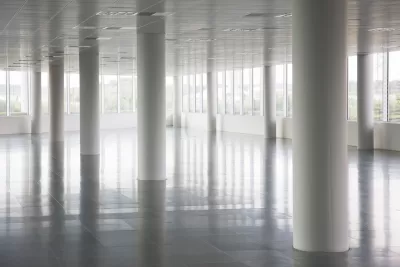Where conditions are right for office-to-residential adaptive reuse, projects can be completed faster and at a significantly lower cost than new construction.

A study from Gensler reveals that converting office buildings to housing could cost 30 percent less than new construction—where conversion is feasible. As Nish Amarnath explains in Smart Cities Dive, “Gensler said U.S. office vacancies reached a 30-year high in the second quarter of 2023, according to the Council of Economic Advisers,” prompting a strong interest in the adaptive reuse of office buildings.
According to the study, 25 percent of the over 1,000 buildings and sites surveyed met the criteria for conversion. “Factors including building form, location and floor plate size helped Gensler determine a building’s suitability for adaptive reuse into housing. Gensler notes that ‘unpleasant’ office features, like low ceilings, can be translated into desirable attributes for a residential building by removing office ducts, lights and drop ceilings to make way for ‘luxurious’ 11-foot clear ceiling heights.”
An adaptive reuse initiative in Calgary is expected to yield an increase in residential units of 24 percent in that city’s downtown core. Meanwhile, the U.S. federal government announced a $350 million investment to support office conversions and adjusted regulations to make office conversion easier for local governments.
FULL STORY: Office-to-residential conversion costs can be 30% lower than new construction: Gensler

Planetizen Federal Action Tracker
A weekly monitor of how Trump’s orders and actions are impacting planners and planning in America.

Maui's Vacation Rental Debate Turns Ugly
Verbal attacks, misinformation campaigns and fistfights plague a high-stakes debate to convert thousands of vacation rentals into long-term housing.

Restaurant Patios Were a Pandemic Win — Why Were They so Hard to Keep?
Social distancing requirements and changes in travel patterns prompted cities to pilot new uses for street and sidewalk space. Then it got complicated.

In California Battle of Housing vs. Environment, Housing Just Won
A new state law significantly limits the power of CEQA, an environmental review law that served as a powerful tool for blocking new development.

Boulder Eliminates Parking Minimums Citywide
Officials estimate the cost of building a single underground parking space at up to $100,000.

Orange County, Florida Adopts Largest US “Sprawl Repair” Code
The ‘Orange Code’ seeks to rectify decades of sprawl-inducing, car-oriented development.
Urban Design for Planners 1: Software Tools
This six-course series explores essential urban design concepts using open source software and equips planners with the tools they need to participate fully in the urban design process.
Planning for Universal Design
Learn the tools for implementing Universal Design in planning regulations.
Heyer Gruel & Associates PA
JM Goldson LLC
Custer County Colorado
City of Camden Redevelopment Agency
City of Astoria
Transportation Research & Education Center (TREC) at Portland State University
Jefferson Parish Government
Camden Redevelopment Agency
City of Claremont





























